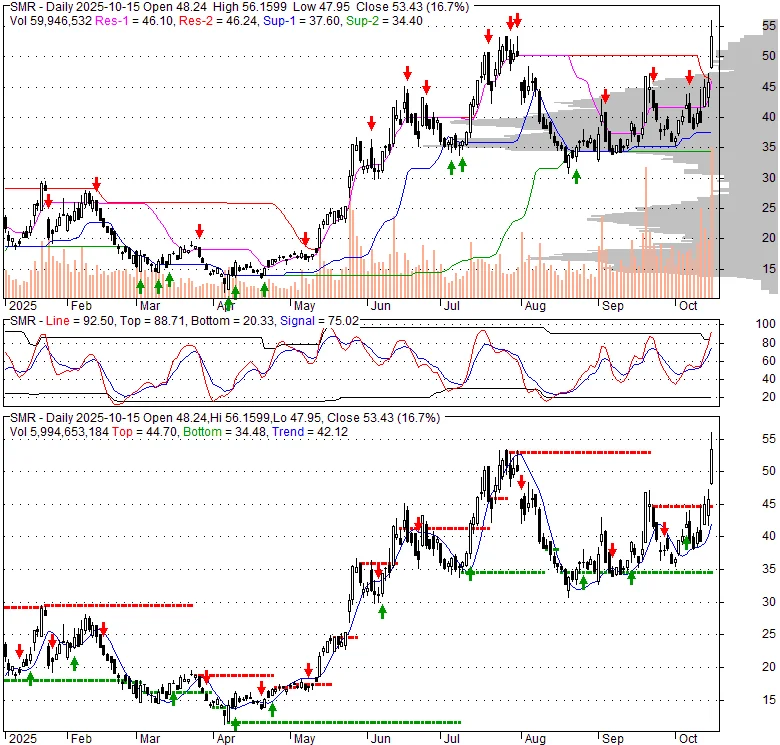So, let me get this straight. The U.S. Army, the same organization that famously spent years and billions developing a camouflage pattern that didn't work in the one place they were fighting, stands up on a stage and says they’re going nuclear. Not with weapons—that’d be too simple. No, they’re getting into the power grid business, promising to sprinkle "next-generation" nuclear microreactors on bases all over the world.
And what happens? The market, in its infinite, twitchy wisdom, immediately loses its mind.
Shares of a company called NuScale Power, which makes the kind of small modular reactors (SMRs) the Army is talking about, shot up over 22% the moment the news broke (Why Is NuScale Power Stock Blasting Higher?). A 22% jump on a government announcement. Not a contract, not a purchase order, not a single signed check. Just a couple of secretaries in suits at the AUSA conference in D.C.—I can practically smell the stale convention center coffee and cheap polyester from here—muttering corporate-approved buzzwords about "reliable power."
This isn't investing. It's Pavlovian conditioning. The government rings a bell labeled "massive, long-term spending," and Wall Street starts salivating, throwing money at anything that even remotely looks like it might get a taste of the kibble. The stock market, in this case, isn't a discerning judge of technological merit; it's a mindless shark frenzy, thrashing at the mere scent of a potential government contract in the water.
Let's call the "Janus Program" what it really is: a fantastic piece of marketing. Naming it after the two-faced Roman god of beginnings and endings is either a stroke of genius or a Freudian slip of spectacular proportions. One face looks toward a bright, clean, energy-independent future. The other? It’s looking right at the taxpayer’s wallet.
Energy Secretary Chris Wright stood up there and promised these little reactors could churn out "multiple megawatts of power" and run for "years, potentially decades, without any refueling." It sounds amazing, right? It’s the kind of line you’d hear in a slick sci-fi movie before everything goes horribly wrong. But what does it actually mean? "Potentially decades" is the kind of weasel-wording that lawyers get paid six figures to write. It’s a promise with a built-in escape hatch.
The real meat of this story, the part that should make everyone pause, is buried in the announcement: the reactors will be "commercially owned and operated."

This is a bad idea. No, 'bad' doesn't cover it—this is a five-alarm dumpster fire of a concept gift-wrapped in the flag. This isn’t about making the military more efficient. This is about creating an entirely new revenue stream for the military-industrial complex, a public-private partnership where the public takes all the risk and the private sector cashes all the checks. Who do you think is going to win those "commercial" contracts? Some scrappy startup from Silicon Valley? Give me a break. It'll be the same handful of defense and energy giants who have had lobbyists camped out in D.C. for decades.
And what happens when one of these things, sitting on a base in Germany or South Korea, has a problem? Who’s liable for the cleanup? The "commercial operator" with a labyrinthine corporate structure designed to shield it from any real responsibility? Or the U.S. taxpayer who, offcourse, will be on the hook for the multi-billion dollar fallout? We all know the answer. It ain't gonna be the shareholders of NuScale.
This whole thing feels less like a serious energy strategy and more like a solution in search of a problem. The Army needs reliable power, sure. But is building a fleet of miniature nuclear reactors, with all the security and waste disposal nightmares that entails, really the most logical path forward? Or is it just the path that guarantees the biggest, longest, most unkillable government contracts?
Think about it. Once these things are built, they become permanent fixtures. They need maintenance, security, specialized staff, and an endless pipeline of funding. They are the ultimate subscription model for government spending. You can't just cancel it when the budget gets tight. It's a jobs program for nuclear physicists and a perpetual annuity for whichever corporation lands the deal.
And for what? To power a base? My own internet is "commercially owned and operated" and it barely works half the time. The idea that we're going to apply that same model to nuclear fission and expect anything other than a glorious, expensive mess is just... well, it’s the kind of optimism that only exists in a government press release.
I keep wondering what questions weren't asked at that conference. Did anyone ask about the nuclear waste? What's the plan for decommissioning these reactors in 40 years? What are the security protocols for putting a nuclear reactor in a potentially unstable region? Or was everyone just blinded by the dollar signs and the shiny promise of "next-gen" tech? Then again, maybe I'm the crazy one for even asking.
The market has already decided. The hype is real, the money is moving, and the actual, difficult questions will be kicked down the road until they become someone else’s problem. That’s the American way.
Let's be brutally honest here. The Janus Program isn't about energy independence or military readiness. That's the brochure. The real product is the contract. This is about using the mystique of "nuclear technology" and the urgency of "national security" to create a firehose of public money aimed directly at the private sector. The NuScale stock surge isn't speculation on a technology; it's a bet on the enduring, unshakable ability of the military-industrial complex to invent new and creative ways to get paid. And it’s a bet that almost always wins.